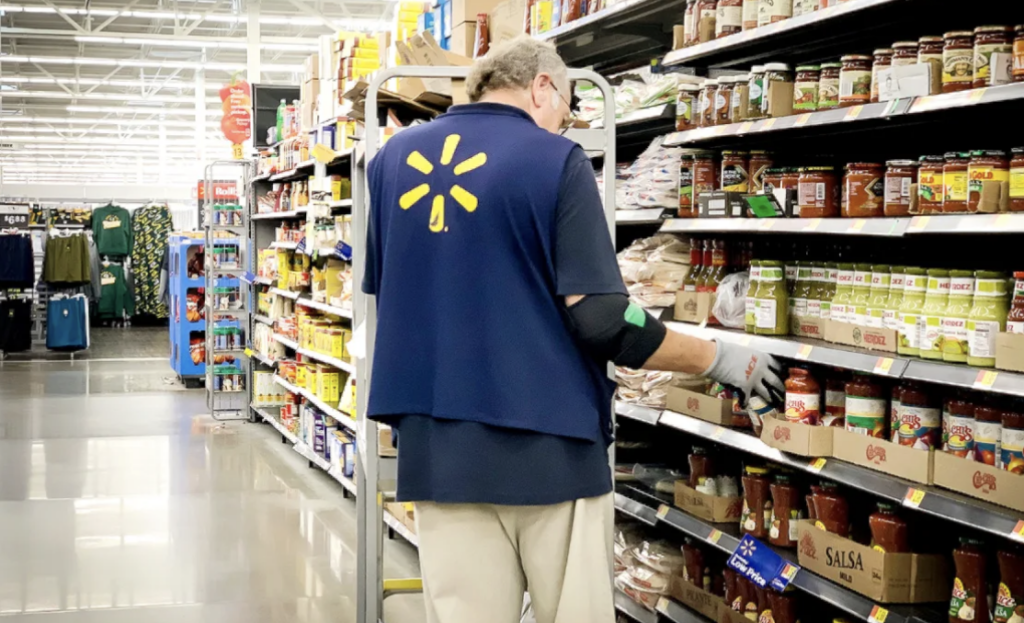What Walmart Really Does With All Its Damaged Products
A former Walmart employee detailed in a TikTok video that Walmart throws away perfectly donatable lightly damaged goods like pet food and laundry detergent at the end of every night.
This article is more than 2 years old
Ever wonder what retail giant Walmart does with all the damaged products it’s left with at the end of the day? Thanks to a former employee who recently went viral on TikTok, now we know. A user named Benson (@ayoitsbenny) exposed his Walmart store’s process for dealing with lightly damaged goods—and you might be surprised to learn the truth.
Benson’s video begins with a superimposed written disclaimer that he doesn’t work at Walmart anymore. Then he pans down to boxes of items that were pulled from the store’s shelves, including open bags of pet food and expired drink mix. He also shows bags of cat litter that he describes as “perfectly fine” and a bottle of what appears to be laundry detergent, discarded simply because it arrived from the warehouse inside a damaged box.
Benson explains the issues with several other damaged products, then walks to a square metal door on the wall. He opens it and says that it’s a trash compactor, then starts tossing in Walmart’s throw-away goods. The last sentence in the video’s caption reads, “I would say go diving, but they crush it all.”
The Daily Dot shared some of the comments the TikTok video received. “I worked in a warehouse, they threw away tons of perfectly fine food. They refused to donate, wasteful as hell,” one user shared. Another said that Target throws a lot of things away.
Benson made a follow-up video expressing frustration after reading the many responses he received to his brief Walmart exposé. Some seemed to blame him for deciding to throw out the usable goods, but he insisted that he was just following his supervisor’s orders. He said he was just a “Cap 2 worker” which means he simply stocked shelves and had no say in whether the store decided to donate damaged products or not.

While destroying open and expired food products—including pet food—is completely understandable from a safety standpoint, it does appear that many of the allegedly damaged products in Benson’s Walmart video could have helped someone in need. With the current state of the economy, more and more people are turning to food banks and other charities to help ends meet. Many of these charitable organizations struggle to remain stocked as their usual donors give less during this time of record inflation.
As one user commented on Benson’s original video, crushing damaged products isn’t always a company-wide policy. “The Walmart where I’m from donates to the food pantry my mother runs and they get a tax write-off or something. Talk to one of the top managers and maybe they could reach out and find the food association in your state,” they said. “It’s not the company as a whole. It’s your specific store’s choices.”
However, donating slightly damaged products and allowing dumpster diving aren’t the easy answers they initially appear to be. Both options come with risks that many, if not most, big corporations like Walmart aren’t willing to take. An open dumpster-diving policy can lead to lawsuits if someone gets injured on the store’s property, and donations can open a whole new proverbial can of worms if expired food makes someone sick.
Some companies such as Amazon are trying methods to generate less waste, including allowing customers to keep damaged goods while also receiving a refund. Walmart also has a formula it uses to decide if a customer can get a refund while keeping an item they wish to return, but they haven’t revealed the exact process. Several years ago, a person named Jenny Miller started a Change.org petition to urge Walmart to stop throwing away pet food that could be donated to shelters instead.
There is often another step between the selling floor and the trash compactor: the clearance aisle. While clearance shelves can appear a jumbled mess, frugal people can often find deep discounts on slightly damaged products and still-edible food near its expiration date. Knowing that this misfit merchandise is destined for the landfill makes clearance shopping an ecologically and economically good decision.




